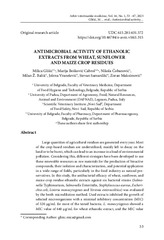Приказ основних података о документу
Antimicrobial activity of ethanolic extracts from wheat, sunflower and maize crop residues
| dc.creator | Glišić, Milica | |
| dc.creator | Bošković Cabrol, Marija | |
| dc.creator | Čobanović, Nikola | |
| dc.creator | Baltić, Milan Ž. | |
| dc.creator | Vranešević, Jelena | |
| dc.creator | Samardžić, Stevan | |
| dc.creator | Maksimović, Zoran | |
| dc.date.accessioned | 2023-06-30T10:36:36Z | |
| dc.date.available | 2023-06-30T10:36:36Z | |
| dc.date.issued | 2023 | |
| dc.identifier.issn | 1820-9955 | |
| dc.identifier.uri | https://vet-erinar.vet.bg.ac.rs/handle/123456789/2975 | |
| dc.description.abstract | Large quantities of agricultural residues are generated every year. Most of the crop-based residues are underutilized, mainly left to decay on the land or to be burnt, which can lead to an increase in a load of environmental pollution. Considering this, different strategies have been developed to use these renewable resources as raw materials for the production of bioactive compounds, their isolation and characterization, and potential application in a wide range of fields, particularly in the food industry as natural preservatives. In this study, the antibacterial effi cacy of wheat, sunfl ower, and maize crop residue ethanolic extracts against six bacterial strains (Salmonella Typhimurium, Salmonella Enteritidis, Staphylococcus aureus, Escherichia coli, Listeria monocytogenes and Yersinia enterocolitica) was evaluated by the broth microdilution method. Used extracts inhibited the growth of selected microorganisms with a minimal inhibitory concentration (MIC) o f 320 μg/mL for most of the tested bacteria . L. monocytogenes showed a MIC value o f 640 μg/mL for wheat ethanolic extract, and the MIC value of sunflower ethanolic extract for S. Typhimurium wa s 160 μg/mL. Th ere were no minimum bactericidal concentration (MBC) values for any of the bacteria within the extract’s concentration ranges tested (≤ 2560 μg/mL). The results of the present study indicate that crop residue ethanolic extracts could exhibit bacteriostatic effect and therefore have the potential as natural additives in food preservation. | sr |
| dc.language.iso | en | sr |
| dc.publisher | Scientific Institute for Veterinary Medicine (Novi Sad) | sr |
| dc.relation | info:eu-repo/grantAgreement/ScienceFundRS/Ideje/7752847/RS// | sr |
| dc.relation | info:eu-repo/grantAgreement/MESTD/inst-2020/200143/RS// | sr |
| dc.rights | openAccess | sr |
| dc.rights.uri | https://creativecommons.org/licenses/by/4.0/ | |
| dc.source | Archives of Veterinary Medicine | sr |
| dc.subject | agricultural waste | sr |
| dc.subject | MIC and MBC | sr |
| dc.subject | maize and sunflower stalks | sr |
| dc.subject | wheat straw | sr |
| dc.subject | foodborne pathogens | sr |
| dc.title | Antimicrobial activity of ethanolic extracts from wheat, sunflower and maize crop residues | sr |
| dc.type | article | sr |
| dc.rights.license | BY | sr |
| dc.citation.volume | 16 | |
| dc.citation.issue | 1 | |
| dc.citation.spage | 53 | |
| dc.citation.epage | 67 | |
| dc.identifier.doi | https://doi.org/10.46784/e-avm.v16i1.315 | |
| dc.identifier.fulltext | http://veterinar.vet.bg.ac.rs/bitstream/id/8769/36-35-PB-55-69.pdf | |
| dc.type.version | publishedVersion | sr |

